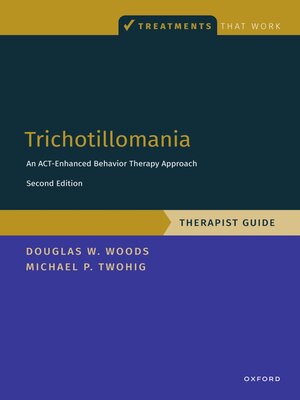Trichotillomania
ebook ∣ Therapist Guide: An ACT-enhanced Behavior Therapy Approach Therapist Guide · Treatments That Work
By Michael P. Twohig

Sign up to save your library
With an OverDrive account, you can save your favorite libraries for at-a-glance information about availability. Find out more about OverDrive accounts.
Find this title in Libby, the library reading app by OverDrive.



Search for a digital library with this title
Title found at these libraries:
| Library Name | Distance |
|---|---|
| Loading... |
Trichotillomania (TTM) is a complex disorder that is difficult to treat and few effective therapeutic options exist. This Therapist Guide for the Acceptance and Commitment Therapy (ACT) Enhanced Behavior Therapy for Trichotillomania (AEBT-T), and the accompanying client workbook, is a 10-session program designed to teach therapists how to help clients reduce their pulling, think differently about the internal experiences that trigger pulling, and learn to live a more valued life. The approach blends traditional behavior therapy approaches of habit reversal training and stimulus control techniques with a more contemporary ACT-based approach. This ACT-based approach teaches clients to behave flexibly and concert with their values whenever they face the uncomfortable thoughts, feelings, urges, and cravings that often trigger the pulling. Since its original publication in 2008, AEBT-T has been studied extensively and shown to be effective in individual and group format using both face-to-face and telehealth modalities. Emerging evidence suggests the treatment can also be successfully applied to older children and adolescents, and this latest version of the manual describes how the treatment can be modified for these populations. Fully updated to reflect new research and organized in an easy-to-use session-by-session format with accompanying therapy support forms and materials, this intervention has proven efficacy and will be a valuable resource and powerful tool for clinicians who commonly treat TTM, OCD and related disorders.







